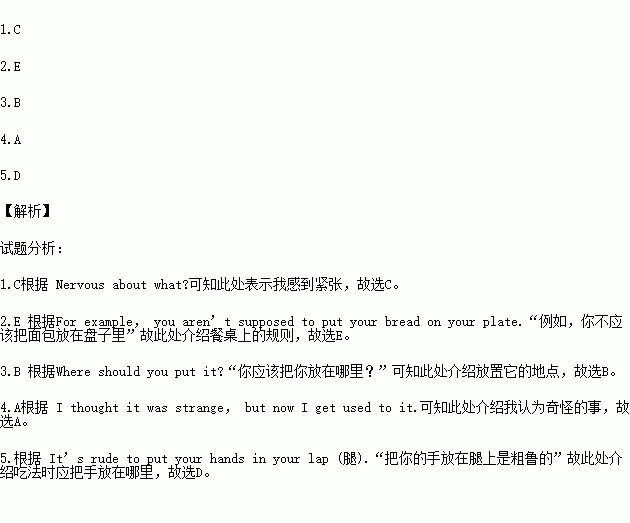题目内容
情景交际
根据对话内容,从下面方框中选出恰当的句子补全对话,并将选定答案的字母标号填
在题号对应的横线上。
A: Hello, Steve! You must have had an unusual experience living in France.
B: Yeah, Tom, 1.
A: Nervous about what?
B: Well, for one thing, I didn’t know how to behave at the dinner table.
A: 2.
B: For example, you aren’t supposed to put your bread on your plate.
A: Where should you put it?
B: 3.
A: Oh, it’s pretty strange.
B: I thought it was strange, but now I get used to it.
A: 4.
B: It’s rude to put your hands in your lap (腿). 5.
A: Oh, it’s really surprising.
A. What else do you think surprising? B. You are supposed to put it on the table! C. But I was a little nervous at first. D. You should always keep your hands on the table. E. What rules do they have then? |
根据短文内容,用方框中所给词的正确形式填空,使短文完整、正确,并把答案写在答题卡(纸)的相应位置(每个词只能用一次)。
good, give, and, possible, other, help, animal, for, be, we |
Volunteering takes up our time, energy, and even costs money. It can be hard work. So why should we do it? Well, here 1. some reasons:
Firstly, volunteering is good for 2. . The world is not perfect; Many people and animals need help. Secondly, governments try to meet everyone’s needs, but it’s 3. for them to do all that. Thirdly, if we never
help each other and only care about 4. , the world will be a sad place. If we work together, we can make life easier and happier. But what can we do?
★Bring food to hungry people, and bring comfort 5. happiness to lonely people.
★Make neighborhoods safer and more friendly.
★Protect wildlife and natural areas; help care for pets and wild 6. .
At the same time, it is good for us to do volunteering work 7. our society. We can get many benefits like the following through it:
? Get important skills and experience.
? Build confidence and self-esteem(自尊).
? Feel satisfied after 8. other.
Since volunteering is so good for us, for others and for the whole society, why don’t we try our 9. to do it? If every one of us 10. our love to others, the world will become much better!

